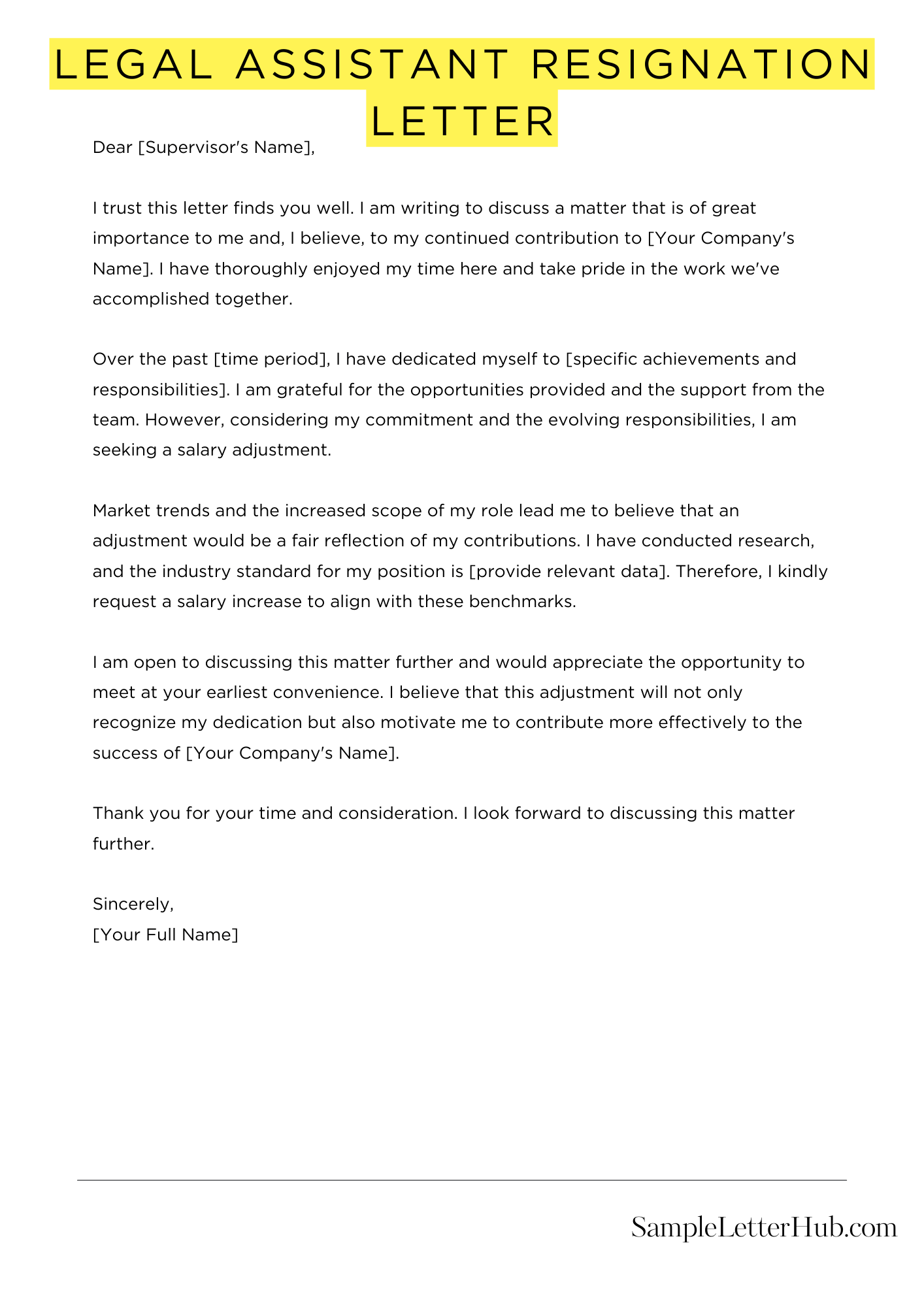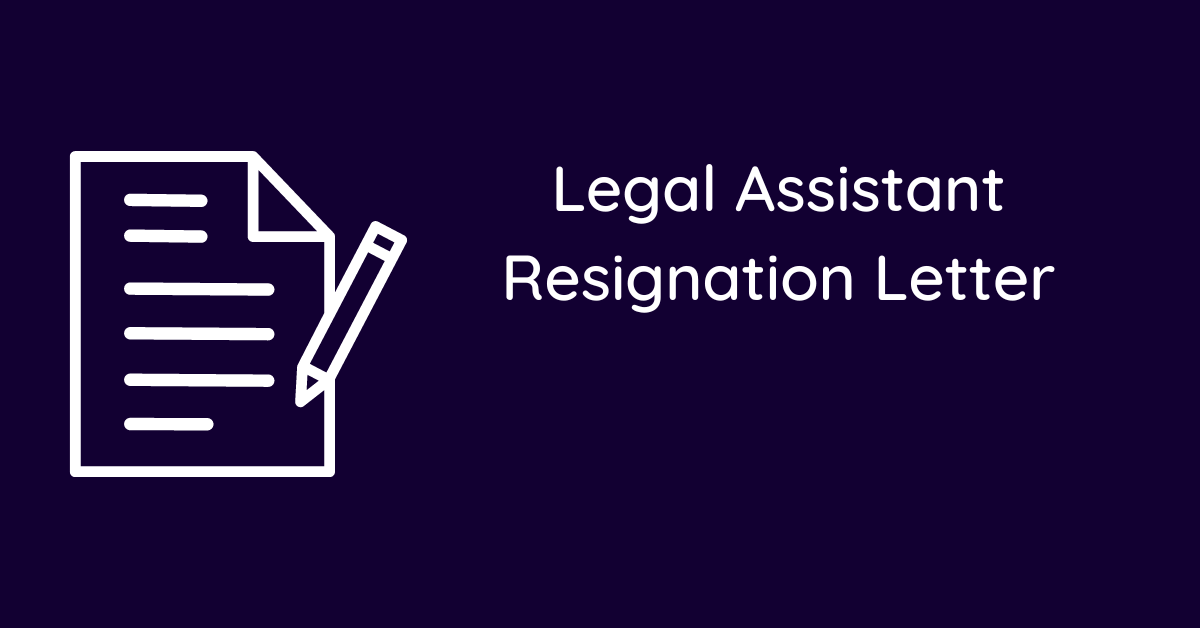When it comes to leaving a job, a well-written resignation letter is key. In this article, we’ll share an example of a legal assistant resignation letter to help you craft your own.
A resignation letter is a formal way to inform your employer of your decision to leave. It should be clear, concise, and professional. Be sure to express your gratitude for the opportunity to work at the firm and wish them well in the future.
Below, we’ve included a template/example legal assistant resignation letter that you can use as inspiration. Feel free to tailor it to your own situation and needs.
Legal Assistant Resignation Letter
Dear Mr./Ms. [Recipient Name],
Please accept this letter as formal notification that I will be resigning from my position as Legal Assistant at [Company/Organization Name], effective two weeks from today, [Last Date of Employment].
During my tenure, I have valued the opportunities and experiences I have gained. I am grateful for the support and guidance I have received from you and the team.
I wish you and [Company/Organization Name] all the best in the future.
Sincerely,
[Your Signature]
Short Legal Assistant Resignation Letter Sample
Please accept this letter as formal notification that I am resigning from my position as Legal Assistant at [Company Name]. My last day of employment will be [Your Last Day]. Thank you for the opportunity to grow and learn during my time here. I wish you and the company continued success. I am happy to assist in the transition process to ensure a smooth handover of my responsibilities.
I wish you all the best with your legal assistant resignation letter.
When it’s time to say farewell, expressing your gratitude and best wishes can make the transition smoother:

How to Write a Legal Assistant Resignation Letter
Writing a resignation letter can be a daunting task, especially when you’re leaving a position as a legal assistant. After all, you’ve likely played a vital role in the firm’s success, and you want to leave on a positive note.
Be Clear and Concise
Your resignation letter should be clear and concise. State your intention to resign from your position as a legal assistant, and provide your last date of employment. You don’t need to go into detail about your reasons for leaving, but you can briefly mention them if you feel comfortable doing so.
Express Your Gratitude
Take the time to express your gratitude to your employer for the opportunity to work at the firm. Mention the skills and experience you’ve gained during your time there, and how they’ve helped you grow professionally.
Offer to Help with the Transition
If you’re able to, offer to help with the transition during your notice period. This could involve training your replacement or helping to wrap up any outstanding projects.
Keep it Professional
Even though you’re leaving the firm, it’s important to keep your resignation letter professional. Avoid making any negative comments about the firm or your colleagues. Instead, focus on the positive aspects of your experience and express your well wishes for the firm’s future success.
Proofread Carefully
Before you submit your resignation letter, proofread it carefully for any errors. Make sure that your grammar and spelling are correct, and that the letter is formatted properly.
Legal Assistant Resignation Letter: 6 FAQs Answered
Resigning from a legal assistant position can be a nerve-wracking experience. To help you navigate this process smoothly, we’ve compiled a list of the six most frequently asked questions and their answers.
1. What are the essential elements of a legal assistant resignation letter?
A well-crafted resignation letter should include the following:
- A clear statement of your intent to resign
- Your last date of employment
- An expression of gratitude for the opportunity to work at the firm
- A professional and respectful tone
2. How much notice should I give?
The standard notice period for a legal assistant is two weeks. However, it’s always advisable to check your employment contract or firm policy for specific guidelines.
3. Can I negotiate my notice period?
In some cases, you may be able to negotiate a shorter or longer notice period with your employer. This is especially true if you have a good relationship with your boss and the firm is facing staffing challenges.
4. What should I do if I’m feeling overwhelmed by the resignation process?
It’s perfectly normal to feel a mix of emotions when resigning from a job. If you’re feeling overwhelmed, don’t hesitate to reach out to a trusted friend, family member, or career counselor for support.
5. What are some tips for writing a strong resignation letter?
- Keep it brief and to the point.
- Use formal language and avoid slang or colloquialisms.
- Proofread your letter carefully before submitting it.
- Consider having a friend or family member review it for feedback.
6. What should I do after I submit my resignation letter?
Once you’ve submitted your resignation letter, it’s important to maintain a positive and professional attitude. Continue to perform your job duties to the best of your ability and assist with the transition process.
Before making the decision to resign from your job, it’s essential to consider the legal aspects:
Understanding your emotions after quitting your job is important. Explore why you might be feeling sad:
Related
- Resignation letter sample
- Forced resignation letter
- Resignation letter due to going abroad
- Resignation letter due to marriage
- Resignation letter due to other opportunity
- Resignation letter due to mistake

